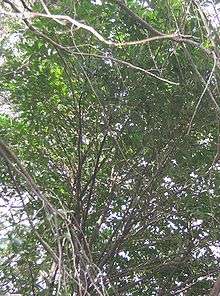Eurya
Eurya is a genus of about 70 species of flowering plants in the family Pentaphylacaceae.[1]
| Eurya | |
|---|---|
 | |
| Eurya japonica, habitus | |
| Scientific classification | |
| Kingdom: | Plantae |
| Clade: | Tracheophytes |
| Clade: | Angiosperms |
| Clade: | Eudicots |
| Clade: | Asterids |
| Order: | Ericales |
| Family: | Pentaphylacaceae |
| Tribe: | Freziereae |
| Genus: | Eurya Thunb. |
| Species | |
|
See text | |
Fossil record
Several fossil seeds of Eurya stigmosa have been described from Middle Miocene strata of the Fasterholt area near Silkeborg in central Jutland, Denmark.[2] Eurya macrofossils have also been described from late Zanclean strata of the Pliocene in Pocapaglia, Italy.[3] Seed fossils of Eurya stigmosa were also reported from the Early Pleistocene (Calabrian stage) of Madeira Island (Atlantic Ocean, Portugal)[4]
Species
- Eurya emarginata
- Eurya japonica Thunb.
- Eurya rapensis F.Brown
- Eurya rengechiensis Yamamoto (Taiwan)
- Eurya sandwicensis A.Gray - Ānini (Hawaiʻi)
The leaves of Eurya are eaten by caterpillars of some Lepidoptera, such as the engrailed (Ectropis crepuscularia).
gollark: Perhaps I am to further develop Minoteaur.
gollark: It would ruin the surprise.
gollark: Nope!
gollark: ++invite
gollark: This is known, yes.
References
- Stevens, P.F., Angiosperm Phylogeny Website, retrieved 2014-09-18
- Angiosperm Fruits and Seeds from the Middle Miocene of Jutland (Denmark) by Else Marie Friis, The Royal Danish Academy of Sciences and Letters 24:3, 1985
- Messian to Zanclean vegetation and climate of Northern and Central Italy by Adele Bertini & Edoardo Martinetto, Bollettino della Societa Paleontologica Italiana, 47 (2), 2008, 105-121. Modena, 11 lugio 2008.
- Góis-Marques, Carlos A.; Mitchell, Ria L.; de Nascimento, Lea; Fernández-Palacios, José María; Madeira, José; Menezes de Sequeira, Miguel (February 2019). "Eurya stigmosa (Theaceae), a new and extinct record for the Calabrian stage of Madeira Island (Portugal): 40Ar/39Ar dating, palaeoecological and oceanic island palaeobiogeographical implications". Quaternary Science Reviews. 206: 129–140. doi:10.1016/j.quascirev.2019.01.008.
This article is issued from Wikipedia. The text is licensed under Creative Commons - Attribution - Sharealike. Additional terms may apply for the media files.